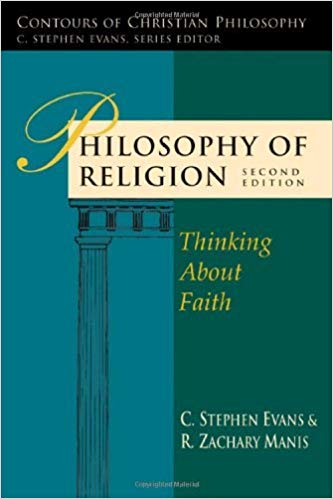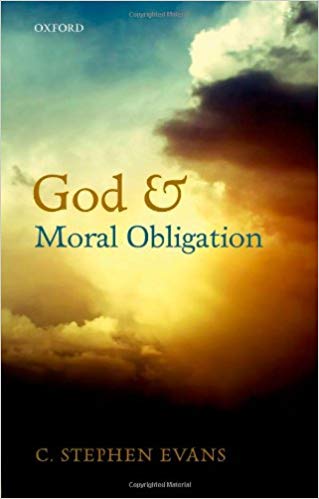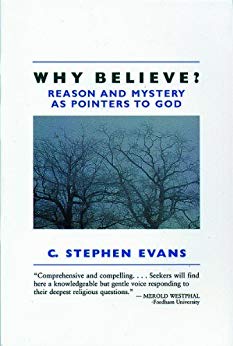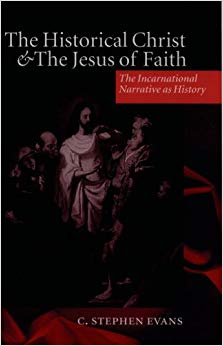Background
C. Stephen Evans was born on May 26, 1948, in Atlanta, Georgia, United States. He is the son of Charles H. Evans, a bus driver, and Pearline B. Evans, a schoolteacher.

Wheaton, Illinois, United States
Wheaton College
New Haven, Connecticut, United States
Yale University
Society of Christian Philosophers





(With over 40,000 copies in print since its original publi...)
With over 40,000 copies in print since its original publication in 1982, Steve Evans's Philosophy of Religion has served many generations of students as a classic introduction to the philosophy of religion from a Christian perspective. Over the years the philosophical landscape has changed, and in this new edition Zach Manis joins Evans in a thorough revamping of arguments and information, while maintaining the qualities of clarity and brevity that made the first edition so appreciated. New material on divine foreknowledge and human freedom has been added as well as on Reformed epistemology. The discussions on science now cover new developments from cognitive psychology and naturalism as well as on the fine-tuning of the cosmos. The chapter on faith and reason has been expanded to include consideration of evidentialism. The problem of evil now forms its own new chapter and adds a discussion of the problem of hell. The standard features remain: a survey of the field, an examination of classical arguments for God's existence, and an exploration of contemporary challenges to theism from the social sciences and philosophy as well as the natural sciences. The meaning and significance of personal religious experience, revelation and miracles--all within the realm of contemporary religious pluralism--are likewise investigated. A classic introduction thoroughly updated and refreshed for today's student.
https://www.amazon.com/gp/product/B003A83Y0W/?tag=2022091-20

(Is there a connection between religion and morality? Ivan...)
Is there a connection between religion and morality? Ivan Karamazov, in Dostoevsky's The Brothers Karamazov, famously declares that if God does not exist, then "everything is permitted." Most philosophers reject such a view and hold that moral truths do not depend on God. C.Stephen Evans argues that the truth lies somewhere between these two claims. It is not quite right to say that there would be nothing left of morality if God did not exist, but moral obligations do depend on God ontologically. Such obligations are best understood as God's commands or requirements, communicated to humans in a variety of ways, including conscience. In God and Moral Obligation, Evans also argues that two views often thought to be rivals to a divine command morality, natural law ethics and virtue ethics, are not rivals at all but provide necessary complementary elements of a comprehensive morality. A number of objections to a divine command account of moral obligations are posed and answered. In the concluding chapters Evans points out the advantages such an account has over secular rivals. The authority and objectivity of moral obligations are best explained by seeing them as divine commands.
https://www.amazon.com/gp/product/0199696683/?tag=2022091-20

(For philosophers, the pursuit of truth travels on precise...)
For philosophers, the pursuit of truth travels on precise definitions. For Christian apologists, the defense of the faith is founded on the defining Word. And for beginning students of either discipline, the difference between success and frustration begins with understanding the terms and ideas and identifying the thinkers and movements. The Pocket Dictionary of Apologetics & Philosophy of Religion is designed to be a companion to your study of these two related disciplines. Among its 300 entries are terms, from a posteriori to worldview apologists, from Abelard to Van Til philosophers of religion, from Alston to Wolterstorff movements, from analytic philosophy to voluntarism apologetic arguments, from the cosmological to the wager theologies, from Arminianism to Zoroastrianism Here is an affordable and easily accessible "help key" for your readings, lectures, writing assignments and exam preparation. It's a must-have study aid for any student who expects to cogitate on coherentism or ruminate on Ricouer.
https://www.amazon.com/gp/product/B003JMFKSS/?tag=2022091-20

(Is there such a thing as natural knowledge of God? C. Ste...)
Is there such a thing as natural knowledge of God? C. Stephen Evans presents the case for understanding theistic arguments as expressions of natural signs in order to gain a new perspective both on their strengths and weaknesses. Three classical, much-discussed theistic arguments - cosmological, teleological, and moral - are examined for the natural signs they embody. At the heart of this book lie several relatively simple ideas. One is that if there is a God of the kind accepted by Christians, Jews, and Muslims, then it is likely that a 'natural' knowledge of God is possible. Another is that this knowledge will have two characteristics: it will be both widely available to humans and yet easy to resist. If these principles are right, a new perspective on many of the classical arguments for God's existence becomes possible. We understand why these arguments have for many people a continued appeal but also why they do not constitute conclusive 'proofs' that settle the debate once and for all. Touching on the interplay between these ideas and contemporary scientific theories about the origins of religious belief, particularly the role of natural selection in predisposing humans to form beliefs in God or gods, Evans concludes that these scientific accounts of religious belief are fully consistent, even supportive, of the truth of religious convictions.
https://www.amazon.com/gp/product/0199217165/?tag=2022091-20

(C. Stephen Evans provides a clear, readable introduction ...)
C. Stephen Evans provides a clear, readable introduction to Søren Kierkegaard (1813–55) as a philosopher and thinker. His book is organised around Kierkegaard's concept of the three 'stages' or 'spheres' of human existence, which provide both a developmental account of the human self and an understanding of three rival views of human life and its meaning. Evans also discusses such important Kierkegaardian concepts as 'indirect communication', 'truth as subjectivity', and the Incarnation understood as 'the Absolute Paradox'. Although his discussion emphasises the importance of Christianity for understanding Kierkgaard, it shows him to be a writer of great interest to a secular as well as a religious audience. Evans' book brings Kierkegaard into conversation with western philosophers past and present, presenting him as one who gives powerful answers to the questions which philosophers ask.
https://www.amazon.com/gp/product/B003HNNLGM/?tag=2022091-20

(C. Sephen Evans has written a pointed and personal book d...)
C. Sephen Evans has written a pointed and personal book directed to those who want to have faith but whose thinking has been obscured by the static of prevailing philosophies, illuminating the attraction and reasonableness of Christianity.
https://www.amazon.com/gp/product/B002R5AONE/?tag=2022091-20

(Few writer-philosophers of the past have evoked as much c...)
Few writer-philosophers of the past have evoked as much curiosity in the twentieth century than Soren Kierkegaard. The further one probes into his thought the more his ideas prove to have relevance for the modern world and especially to Christians. Such is the case with psychology. For Kierkegaard, the study of psychology is intrinsically linked with the task of personal becoming, reflecting his own struggle to overcome the dark and cheerless environment of his early life. His interpretive framework os consciously Christian. In his view, humankind was made for relation with God, and this recognition is basic to self-understanding. But in self-deception and rebellion against God, human beings are constantly resisting their own true happiness and fighting against their own best interests. On this Kierkegaardian premise, C. Stephen Evans unfolds the implications and effects of this human desire for wholeness and growth of the self. This book is written "for psychologists, pastors, counselors, and ordinary people struggling to understand themselves and others."
https://www.amazon.com/gp/product/B00NF5JQKM/?tag=2022091-20

(Kierkegaard on Faith and the Self represents a rich colle...)
Kierkegaard on Faith and the Self represents a rich collection of studies that allow Søren Kierkegaard to speak directly to the questions of contemporary readers. Evans analyzes Kierkegaard as a philosopher, his perspectives on faith, reason, and epistemology, ethics, and his view of the self. Evans makes a strong case that Kierkegaard has something crucial to say to the Christian church as a philosopher and something equally crucial to say to the philosophical world as a Christian believer.
https://www.amazon.com/gp/product/B001CJXYZQ/?tag=2022091-20

(C. Stephen Evans explains and defends Kierkegaard's accou...)
C. Stephen Evans explains and defends Kierkegaard's account of moral obligations as rooted in God's commands, the fundamental command being `You shall love your neighbour as yourself'. The work will be of interest not only to those interested in Kierkegaard, but also to those interested in the relation between ethics and religion, especially questions about whether morality can or must have a religious foundation. As well as providing a comprehensive reading of Kierkegaard as an ethical thinker, Evans puts him into conversation with contemporary moral theorists. Kierkegaard's divine command theory is shown to be an account that safeguards human flourishing, as well as protecting the proper relations between religion and state in a pluralistic society.
https://www.amazon.com/gp/product/B000TQ6G1C/?tag=2022091-20

(The story of Jesus of Nazareth, as recounted in the New T...)
The story of Jesus of Nazareth, as recounted in the New Testament, has always been understood by the church to be historically true. It is an account of the life, death, and resurrection of a real person, whose links with history are firmly signalled in the creeds of the early church, which affirm that Jesus `suffered under Pontius Pilate'. Contemporary historical scholarship has, however, called into question the reliability of the church's version of this story, and thereby raised the question as to whether ordinary people can know its historical truth. This book argues that the historicity of the story still matters, and that its religious significance cannot be captured by the category of `non-historical myth'. The commonly drawn distinction between the Christ of faith and Jesus of history cannot be maintained. The Christ who is the object of faith must be seen as historical; the Jesus who is reconstructed by historical scholarship is always shaped by commitments of faith. A reconsideration of the Englightenment epistemologies that underlie much historical scholarship shows that historical knowledge of this story is still possible. Such knowledge can be inferential, based on historical evidence. A careful look at contemporary New Testament studies, and the philosophical and literary assumptions upon which it rests, shows that this scholarship should not undermine the confidence of lay people who believe that they can know that the church's story about Jesus is true.
https://www.amazon.com/gp/product/B00JEFHQ7W/?tag=2022091-20
C. Stephen Evans was born on May 26, 1948, in Atlanta, Georgia, United States. He is the son of Charles H. Evans, a bus driver, and Pearline B. Evans, a schoolteacher.
Evans graduated from the Wheaton College with high honors, he became Bachelor of Arts there in 1969. Five years later he received his doctor's degree from the Yale University.
Evans taught at such educational institutions as the Trinity College, the Wheaton College, the St. Olaf College and the Calvin College, the Western Kentucky University. At the Wheaton College he began as an assistant professor, from 1974 till 1978, becoming an associate professor in 1978, holding that position for 4 years as well. Finally, he became a professor of philosophy and psychology there, working also for 4 years from 1982.
Evans was appointed to the Howard and Edna Hong Kierkegaard Library as a professor of philosophy and curator, working there from 1986 to 1994.
At the Trinity Evangelical Divinity School Evans was a visiting lecturer. He served at the Regent College at the position of a visiting professor. In addition, Evans was a lecturer at colleges and universities, including the Knox College, the Emory University, the University of Georgia, and the Gordon College. He was a member of an international scholarly committee of the Kierkegaard Research Centre of the University of Copenhagen.
Now he serves on the editorial boards of a great number of publications, such as the Kierkegaard Monographs and the International Kierkegaard Commentary Series. Evans has published several books dealing with Kierkegaard, philosophy of religion, philosophy of psychology, and theology.
He is also a contributor of a great number of articles and reviews to journals, including the Faith and Philosophy, the International Journal for Philosophy of Religion, the Philosophia Reformata, the Journal of Mind and Behavior, and the Christian Scholars Review, he is an editor of the Soeren Kierkegaard Newsletter, as well as a contributing editor of the Journal of Psychology and Theology. Evans is a member of editorial board of the Religious Studies and the Books and Culture. In addition, he is a professor of Philosophy and Humanities at Baylor University.
(With over 40,000 copies in print since its original publi...)
(Is there a connection between religion and morality? Ivan...)
(Kierkegaard on Faith and the Self represents a rich colle...)
(The story of Jesus of Nazareth, as recounted in the New T...)
(Few writer-philosophers of the past have evoked as much c...)
(For philosophers, the pursuit of truth travels on precise...)
(Is there such a thing as natural knowledge of God? C. Ste...)
(C. Stephen Evans provides a clear, readable introduction ...)
(C. Sephen Evans has written a pointed and personal book d...)
(C. Stephen Evans explains and defends Kierkegaard's accou...)
Quotations: “My primary motivation for writing is to contribute to the development of Christian philosophy.”
Evans is a member of the American Philosophical Association, the American Academy of Religion, and a member of the executive committee of the Institute for Advanced Christian Studies.
He was a fellow of the National Endowment for the Humanities and the Center for Faith Development at the Emory University.
Evans married Jan Walter, a professor of Spanish, on September 6, 1969. They have 3 children - Kelley, Lise and Charles.
